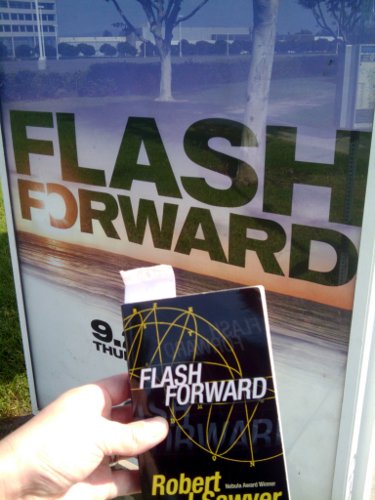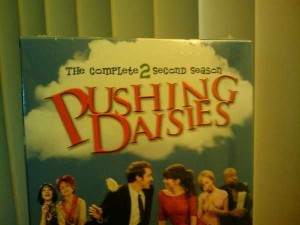I’ve been re-reading Robert J. Sawyer’s original Flashforward novel…

…for obvious reasons.
Adaptation
It’s been interesting to look at both where the TV series diverges from the book: the setting, the time scale, recordings, and in most cases the cast — and where it tracks: the concept, the impact of the worldwide blackout on people now, the way different people approach their foreknowledge, a main character investigating his own murder, and the way the viewpoint organization just pulls together to take point on investigating the incident.
And every once in a while, a specific conversation is adapted. Demetri’s “You’re going to be murdered” phone call from Hong Kong and Theo’s phone call from South Africa are very similar. And there’s a discussion on the likelihood of an event hitting exactly on the hour that was practically lifted for episode two.
I doubt the TV show will tackle the question of whether the universe exists without observers (sort of “If a tree falls and no one is there to hear it, does it make any sound?” taken to the extreme) or the long-term implications of life extension. And somehow I doubt the Large Hadron Collider and search for the Higgs boson are involved (though I noticed the TV show’s Lloyd Simcoe works at Stanford, which does have their own particle accelerator).
It’ll be interesting to see where they go with this.
Prediction
Entirely separate from the TV show, it’s also been interesting to look at the book’s predictions for the present day. Most of it takes place in 2009, but it was published 10 years ago. I list a few items — like getting the Pope’s name right, but missing the explosion of cell phones — in my review of the book from when I read it last year.
Then there’s the suggestion made that one could prove the future can be changed by demolishing some major landmark that many people saw in their visions, but “I don’t suppose the National Park Service is going to let us do that.” In my head, I imagined a deadpan voice saying, “You can’t blow up a national monument.” Hmm, I doubt the cause of the blackouts in the TV show will be robots from space.
